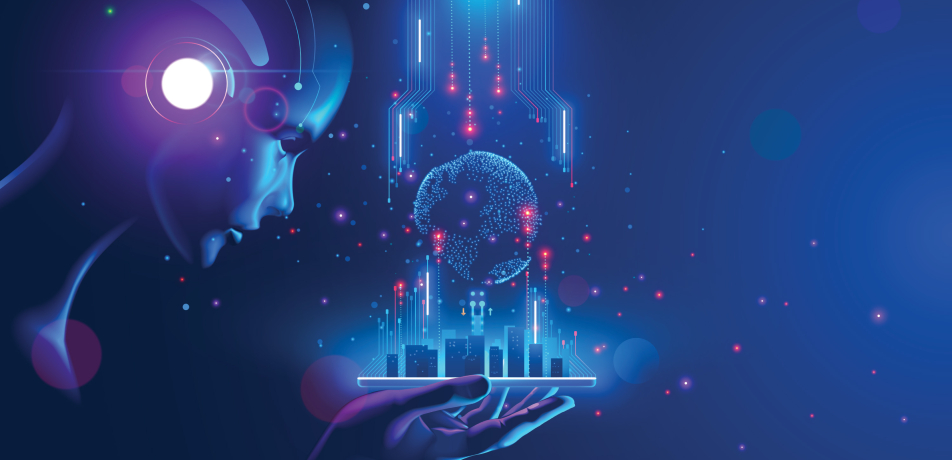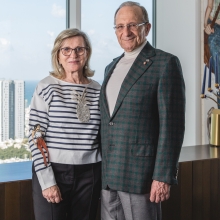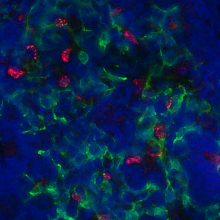The Artificial Intelligence Hub
A ‘computational clubhouse’ for AI and science
Briefs

Asking the right questions is the essence of good science. But you still need to come up with the answers. A new Weizmann initiative is helping to bridge that gap, by creating a community dedicated to solving scientific problems with the help of artificial intelligence. Under the program, a “dream team” of talent from both academia and industry will help realize the potential of AI in advancing scientific discovery, and train Weizmann researchers in the skills they need to apply AI to the questions that matter to them the most. The Institute recently opened its AI Hub―a physical meeting place and research community designed to integrate revolutionary AI technologies into all scientific disciplines. A “computational clubhouse” where students and scientists work with AI experts, the Hub seeks to advance the skills of AI learners at all levels, and provide a space for initiating collaborative projects between Weizmann investigators and AI masters to expand scientific horizons. “AI and big data skills and capabilities are already having a strong impact on science in some fields. But what we currently see is not enough,” says Prof. Amos Tanay of the Department of Computer Science and Applied Mathematics, who co-leads the AI Hub with Dr. Sivan Refaely-Abramson from the Department of Molecular Chemistryand Materials Science and Prof. Elad Shneidman from the Department of Brain Sciences. “To make the most of AI’s potential, we need to teach people who are not trained computational scientists or engineers how to apply these tools to their particular area of interest,” Prof. Tanay explains. “Atthe Hub, Weizmann investigators gain hands-on AI experience, which allows them to become part of integrated teams in which they work with AI experts to advance specific research goals. They become colleagues, capable of forging entirely new approaches and generating real progress.”
Multilayered community
The Hub was conceived as a multilayered community of talent that would be built from the bottom up. At the foundation of this “building” are Weizmann graduate students selected to join the Hub for three months of training, based on proposals explaining how they wish to utilize AI in a particular project. This same kind of personalized training is available to Weizmann faculty members. The next tier of the community is made up of tutors―Weizmann PhD students and postdocs who are already well-versed in AI or data science. Creating individualized training that matches the goals and experience of every Hub participant, the tutors will base their modules on AI success stories in Weizmann labs. This “real life” approach is intended to create a positive feedback loop, promoting the rapid dissemination of new AI techniques into a wide range of groups on campus. Another tier will be the AI Hub Fellows―engineers, programmers, and R&D professionals from industry or top units of the Israel Defense Forces who have a deep understanding of AI and are passionate about using their skills to advance science. Coming to the Institute for anywhere from one to three years, the Fellows are matched with specific labs where they become part of the team. In parallel, they remain an integral part of the Hub community, helping students, tutors, and other AI Fellows overcome challenges, and sharing valuable perspectives on the latest in AI. An initial call for nominations for Fellows, as well as proposals for AI projects, was issued in March 2023. The call generated fascinating ideas for collaboration, as well as excitement about this unique partnership between AI masters and Weizmann scientists. “The Weizmann Institute has always had an interdisciplinary, border-free approach to science,” says Prof. Shimon Ullman of the Department of Computer Science and Applied Mathematics, a renowned authority on computer vision who directs Weizmann’s overall AI program. “The Hub brings this approach to the next level, creating a shared workspace where individuals who would not otherwise interact have the chance to work together. As techniques taught at the AI Hub become familiar to a greater number of Weizmann investigators, I believe it will accelerate research success here on campus and serve as a model for integrating AI into science in institutions all over the world.”
Sivan Refaely-Abramson is supported by:
- Artificial Intelligence for Smart Materials Research Fund, in Memory of Dr. Uriel Arnon
- Peter and Patricia Gruber Awards
- Leah Omenn Career Development Chair
Amos Tanay is supported by:
- Adelis Foundation
- Barry and Janet Lang








